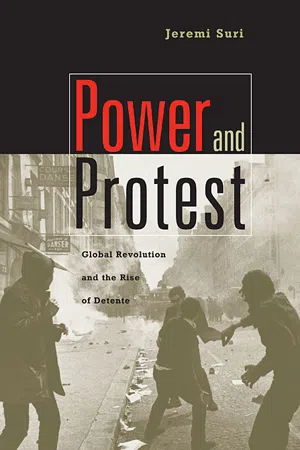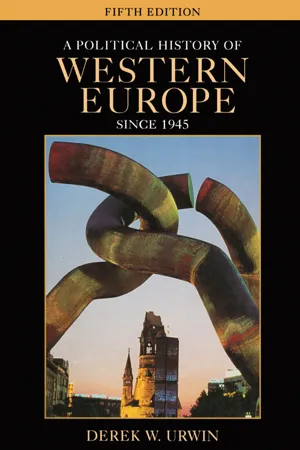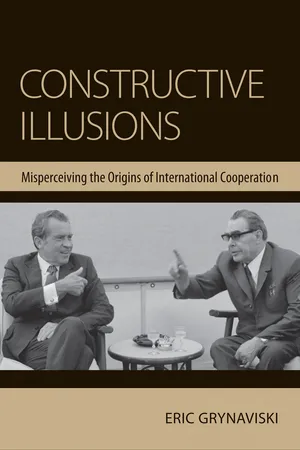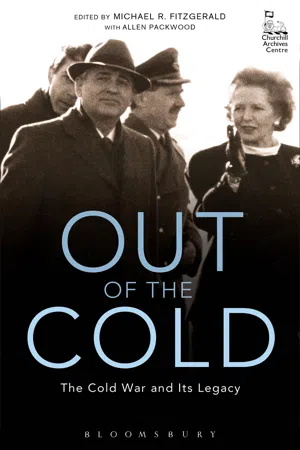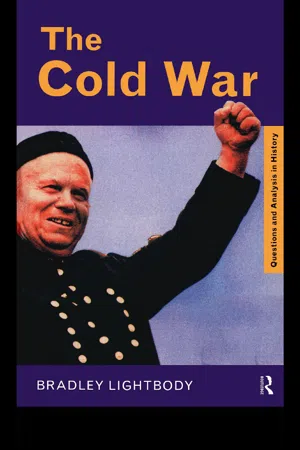History
Détente
Détente refers to a period of improved relations between the United States and the Soviet Union during the Cold War. It was characterized by a reduction in tensions, increased diplomatic dialogue, and efforts to negotiate arms control agreements. Détente aimed to ease the threat of nuclear war and promote peaceful coexistence between the two superpowers.
Written by Perlego with AI-assistance
Related key terms
7 Key excerpts on "Détente"
- eBook - ePub
The Fifty Years War
The United States and the Soviet Union in World Politics, 1941-1991
- Richard Crockatt(Author)
- 2002(Publication Date)
- Routledge(Publisher)
It is noteworthy, though, that Détente should have been talked about in these terms at all. It fed the popular assumption that US–Soviet relations were an either/or matter – cold war or Détente (which indeed was the title of Arbatov’s book on the subject). In actuality the line between cold war and Détente was never so crystal clear, despite the obvious fact that there were periods during which open antagonism predominated and others when negotiation was a central feature of US–Soviet relations.The task of the following three chapters is firstly to examine the conditions which during the late 1960s and early 1970s produced concerted attempts to reduce tension, and secondly to understand the reasons for its limited success. Something like a consensus has been reached among Western analysts of Détente. Certain key conditions – among them the Soviet achievement of effective nuclear parity with the United States by 1969, a growing predisposition on the part of bloc members on both sides to assert independent lines of policy, and relative economic superpower decline, greatly increasing the strains of superpower bloc leadership – inclined both powers to seek accommodation within limited areas, pre-eminently nuclear weapons and European security.To the extent that Détente succeeded it rested on mutual recognition that each side had much to gain from the institutionalization of arms control and confidence-building measures.These saw fruit in the SALT I Treaty and various agreements on means of crisis management, and the lowering of tension in Europe - eBook - ePub
Power and Protest
Global Revolution and the Rise of Détente
- Jeremi Suri(Author)
- 2005(Publication Date)
- Harvard University Press(Publisher)
6THE DIPLOMACY AND DOMESTIC POLITICS OF DETENTE
The distinction between foreign and domestic politics is artificial. During the 1960s nuclear stalemate, alliance disputes, and the Vietnam War were issues of domestic, as well as foreign, policy. Excessive institutional growth, intellectual criticism, and public protest had international, in addition to obvious internal, repercussions. Social and cultural influences created tectonic shifts across frontiers, even in the largely “closed” lands of the Soviet Union and China. As the sources of international stalemate tightened and the evidence of transnational social unrest mounted, leaders in all the major states became aware of their precarious hold on power. Cold War antagonists now unexpectedly recognized their interdependence. Not only could they virtually annihilate one another; they also shared difficulties in maintaining basic order within their boundaries.Policymakers cooperated to protect their authority against a wide range of internal challengers. Detente was, in this sense, a direct reaction to the “global disruption” of 1968. From 1969 through 1972 leaders in each of the major states attempted to reconstruct order from the international “top” down to the domestic “bottom.” They used agreement with foreign adversaries to contain increasingly virulent internal pressures. They used promises of international peace to deflect attention from domestic difficulties and to free their resources for repressive measures. Cooperation among the great powers reinforced established authorities.Despite the chaos on the streets, the years after 1968 witnessed no significant institutional change in any of the major states. The politics of this period were profoundly conservative. At its core, detente was a mechanism for domestic fortification.Like the protesters around them, leaders during the late 1960s questioned many of the inherited assumptions about hostility between capitalist and communist states. New domestic challengers made old international adversaries seem more benign. After two decades of Cold War rivalry, policymakers felt that they understood their foreign enemies and could rely on their consistency and pragmatism. They were known quantities. - eBook - ePub
Managing U.s.-soviet Rivalry
Problems Of Crisis Prevention
- Alexander L. George(Author)
- 2019(Publication Date)
- Routledge(Publisher)
2 Détente: The Search for a "Constructive" RelationshipAlexander L. GeorgeThe emergence and development of Détente between the United States and the Soviet Union after the Cuban missile crisis of October 1962 reflected a mutual desire to move away from the dangerous confrontational policies of the cold war. For Détente to go beyond a mere relaxation of tensions, however, a new relationship between the two superpowers would have to be forged that would moderate the conflictive elements of their earlier relationship. But what kind of nonconfrontational competition would be considered desirable and feasible by each side? Could Soviet and U.S. leaders agree on what form the new relationship should take? Could they find a way to coordinate their policies and behavior to bring about and stabilize a more satisfactory relationship? Could each government cultivate and ensure sufficient domestic support for the new relationship it sought to develop with its adversary?The Framework of Foreign Policy
We can understand better the challenging task undertaken by Soviet and U.S. leaders and the vicissitudes the Détente process was to encounter if we place our discussion within a general foreign policy framework. The essential task of foreign policy is to develop and manage relationships with other states in ways that will contribute to the protection and enhancement of one's own security and welfare. This objective requires that policymakers clearly define their state's interests, differentiate these interests in terms of their relative importance, and prudently weigh the costs and risks of pursuing them. In doing so the policymakers must recognize, analyze, and deal with conflicts of interest with other states. When a mutually acceptable accommodation of conflicting interests with another state is not possible, policymakers must narrow and manage the issues at dispute in ways that reduce these issues' potential for generating destructive conflicts or for contaminating the entire relationship with the other state. The development and management of relationships with other states also requires makers of foreign policy to recognize common interests and to develop policies for promoting them. - eBook - ePub
- Derek W. Urwin(Author)
- 2014(Publication Date)
- Routledge(Publisher)
and competitive co-existence. For it, there was nothing incompatible between a nuclear arms limitation and adventurist policies in the Third World. The essential problem of Détente, therefore, was its ambiguity, and because of this there was no necessary tight linkage between a general principle and the technical specifics of many of the agreements that were concluded. The basic dilemma was perhaps best summarised by James Schlesinger, the American secretary of defense in 1976, who stated, ‘If Détente means everything, it means virtually nothing’.It might be argued that the various discussions and conferences of the 1970s had only a marginal effect upon the political and military constructs of Western Europe. Yet the continent remained central to defence and arms limitation. Western Europe both welcomed Détente, because of the more relaxed atmosphere it would generate and the economic benefits it might bring, and feared it, because it might lead to a reduced American guarantee. At first, welcome was perhaps more prominent than fear. But while Western Europe remained interested in, even committed to, Détente, the shifting balance of military power over the decade forced it to reconsider the parameters of defence. By 1979, many Western leaders had become deeply concerned about the frailty of the Western alliance, and were urging the United States to do something about it. Defence and NATO again became matters of great concern.A REDISCOVERY OF NATOWith the failure of the MLF proposals and France’s withdrawal from the military wing of NATO, European defence arrangements had been thrown into some disarray in the late 1960s. The matter was still unresolved when the heightened fashion for Détente in a sense left NATO high and dry in a cul-de-sac. The lessening of tension encouraged those who wished to dampen down NATO’s role to become more vocal. The façade of a united body under firm and accepted American leadership began to peel during the decade. In the NATO north, the United States was sporadically faced with the threat of being asked to vacate its crucial base on Iceland, which guarded the northern approaches to the Atlantic and which had become even more important with the rise of Soviet naval power, whose main bases lay in the Arctic. The northern flank was already weak because of the neutrality of Sweden and Finland, and because of Norway’s refusal to permit the stationing of nuclear weapons and foreign troops on its soil. As the decade progressed, it was Denmark which was to give rise to concern. Danish governmental stability had been shaken in 1972 by a fragmentation of the party system. A major newcomer was the populist anti-tax Progress Party of Mogens Glistrup, which saw savage cuts in defence expenditure as one way of achieving its aims. While the party never got its way, Denmark, more than other members, steadily evinced a reluctance to keep its defence commitments in line with the rest of NATO. At times, several other states queried its value to the organisation. Denmark became the foremost protagonist of the footnote’, that is, it regularly refused to join in collective NATO statements, preferring to make its own position clear in an appended footnote. - eBook - ePub
Constructive Illusions
Misperceiving the Origins of International Cooperation
- Eric Grynaviski(Author)
- 2014(Publication Date)
- Cornell University Press(Publisher)
2
DÉTENTE
There will be much talk about the necessity for “understanding Russia”; but there will be no place for the American who is really willing to undertake this disturbing task. The apprehension of what is valid in the Russian world is unsettling and displeasing to the American mind. He who would undertake this…the best he can look forward to is the lonely pleasure of one who stands at long last on a chilly and inhospitable mountaintop where few have been before, where few can follow, and where few will consent to believe he has been.GEORGE KENNAN , SEPTEMBER 1944During the early 1970s, the United States and the Soviet Union began a remarkable process of cooperation intended to develop an enduring relationship that would end the excesses of superpower competition. Superpower cooperation was so successful that many prognosticators predicted the end of the Cold War. Perhaps most impressive was the timing. Détente occurred less than ten years after the Cuban Missile Crisis, at the height of the Vietnam War, and nine years before the Soviet incursion in Afghanistan. What enabled the United States and the Soviet Union to improve relations? Was the change from what Richard Nixon called an “era of confrontation” to an “era of negotiation” premised on mutual understanding?Kennan’s statement in the epigraph to this chapter—that one who understands Russia is of no use in American foreign policy and the effort to do so will leave such a person alone “on a chilly and inhospitable mountaintop”—may seem strange to students of diplomacy and international politics. In the previous chapter, I showed that IR theorists often explain peace and cooperation as a product of mutual understanding. In particular, constructivists might argue that the shift in this case from mortal enemies to cooperative rivals was the result of a change in the superpowers’ social relationship.1 The early years of the Cold War, rooted in enmity and ideological warfare, gave way to rivalry and coexistence. These scholars highlight the importance of shared ideas—intersubjectivity—in managing the superpower rivalry.2 - eBook - ePub
Out of the Cold
The Cold War and Its Legacy
- Michael R. Fitzgerald, Allen Packwood(Authors)
- 2013(Publication Date)
- Bloomsbury Academic(Publisher)
CHAPTER FOURFrom Détente to dialogue
The Cold War between 1969 and 1989 featured events that exemplified the hopes and fears that permeated the relationship between the power blocs led by the Soviet Union and the United States. In the wake of the Cuban Missile Crisis, the superpowers stepped back from the brink of nuclear catastrophe and opened an extended, uneven process of stabilizing and improving relations, while simultaneously engaging in an arms race of escalating proportions. Détente offered the promise of a modus vivendi between the United States and the USSR. Its demise produced renewed military rivalry, which paradoxically led to an historic dialogue of the new generation of Cold War leaders: Gorbachev, Thatcher, and Reagan.1The path from Détente to dialogue is traced through the insider perspectives of American, British, and Soviet officials who served in their respective governments at the time. They provide a unique viewpoint on the game-changing movement from the rise and collapse of Détente to the historic dialogue among Cold War leaders, which brought an end to the long era of East-West confrontation. John Warner was a senior official during the Nixon, Reagan, and Bush administrations and he served thereafter with distinction in the US Senate. Franklin Miller served on the National Security Council in the White House and at the Pentagon with the Department of Defense. They offer an insightful account of the development of the massive American program to enhance its strategic arms status, which eventually shifted to arms negotiations during the Reagan years. Lord Powell was Prime Minister Thatcher’s Private Secretary and was a key foreign policy advisor. Sir Roderic Lyne served in the British Diplomatic Service and was the UK Ambassador to Russia. Powell and Lyne, as seasoned diplomats and keen observers, were well positioned to survey the tremendous tensions between the West and Soviet Union during the early Reagan administration. They witnessed the emergence of the relationships among Margaret Thatcher, Ronald Reagan, and Mikhail Gorbachev, which were so very crucial during this period. Alexander Likhotal, who worked with Gorbachev as the General Secretary’s spokesperson and senior advisor, provides a detailed analysis of the transformative vision and actions of the Soviet leader. The distinguished broadcaster and former British Ambassador to the United States, Peter Jay closes the chapter by offering his opinion as to the exact date and time at which the Cold War ended. - eBook - ePub
- Bradley Lightbody(Author)
- 2005(Publication Date)
- Routledge(Publisher)
5 DétenteBACKGROUND NARRATIVE
Both the United States and the Soviet Union were shaken by the Cuban Missile Crisis, which took the world to the brink of nuclear war. The mood was for Détente and safeguards to limit the escalating nuclear arms race. The immediate result was the provision of a ‘hotline’ between Washington and Moscow, set up June 1963, and, in August of the same year, the Test Ban Treaty, which restricted the testing of nuclear weapons.The Cuban Missile Crisis also had European repercussions as both France and Germany entered into independent diplomacy with the Soviet Union. France established trade relations with the Soviet Union in 1964 and withdrew all French forces from NATO in 1966. West Germany, under the leadership of Chancellor Willy Brandt, introduced the policy of Ostpolitik (Eastern Policy) from 1966 to 1972 and achieved a diplomatic breakthrough in relations with Eastern Europe.The high point of Détente was the ‘triangular diplomacy’ conducted by President Nixon and his foreign affairs adviser Henry Kissinger from 1971 to 1974. The People’s Republic of China was admitted to the United Nations in October 1971, ending twenty-two years of isolation, and in February 1972 President Nixon travelled to Beijing for a summit meeting with Mao Zedong. The J g & Soviet Union also entered into a series of summit meetings with the United States, and the result was trade agreements, arms limitations and a significant reduction in Cold War tension.However, after the resignation of President Nixon in August 1974, as a result of the Watergate scandal, a chill began to return to the Cold War. Both President Ford (1974–77) and President Carter (1977–81) found it difficult to maintain Détente against criticism of the Soviet Union’s continued interventions in the Third World and breaches of the human rights provision of the Helsinki Accords of 1975. The fall of Saigon in April 1975 was also a humiliating debacle for the United States and soured the spirit of co-operation.
Learn about this page
Index pages curate the most relevant extracts from our library of academic textbooks. They’ve been created using an in-house natural language model (NLM), each adding context and meaning to key research topics.

